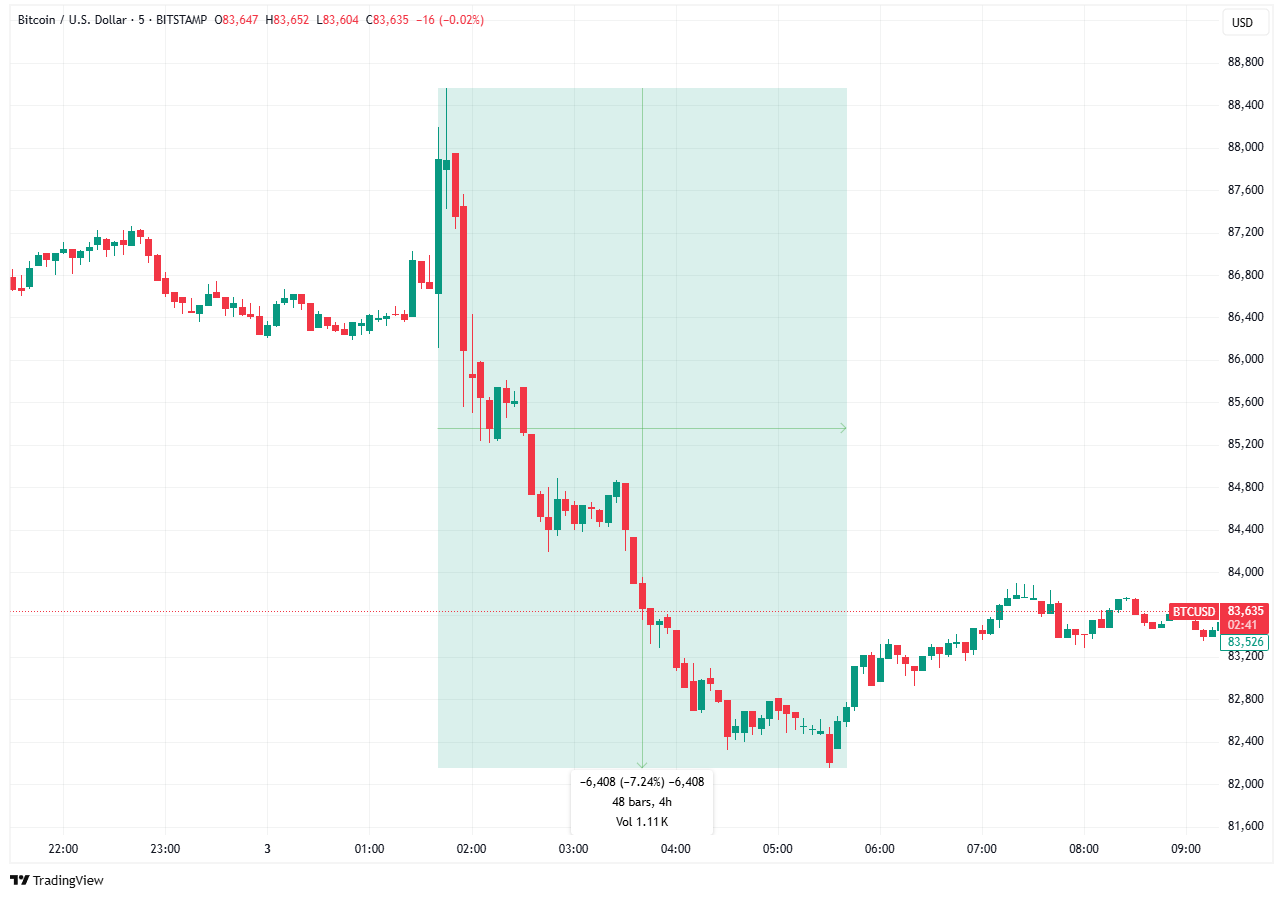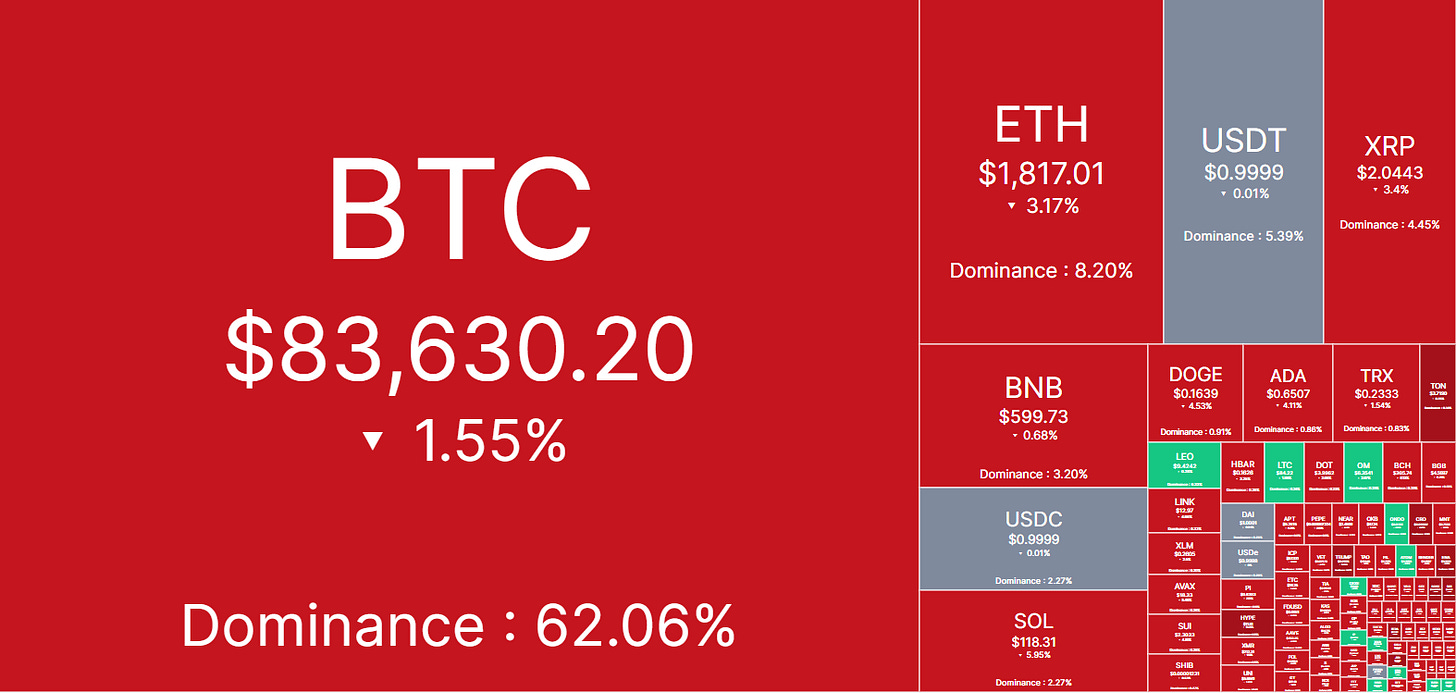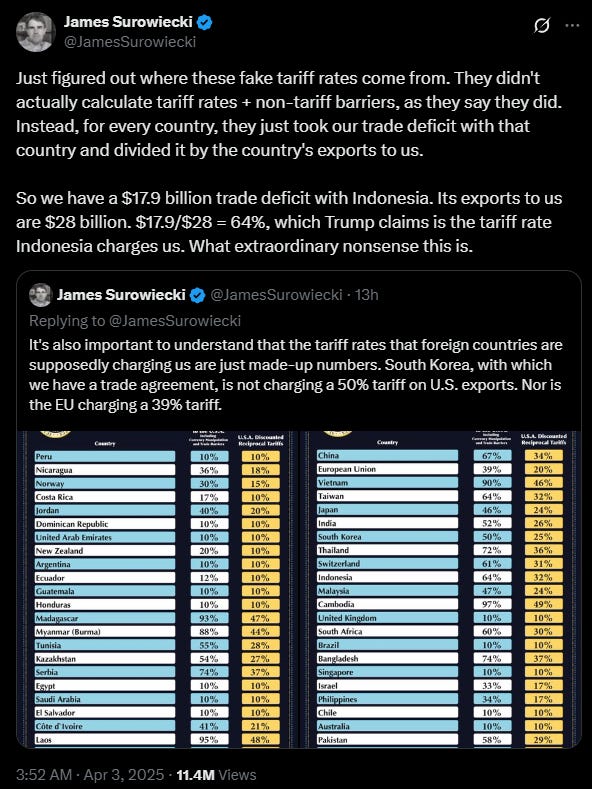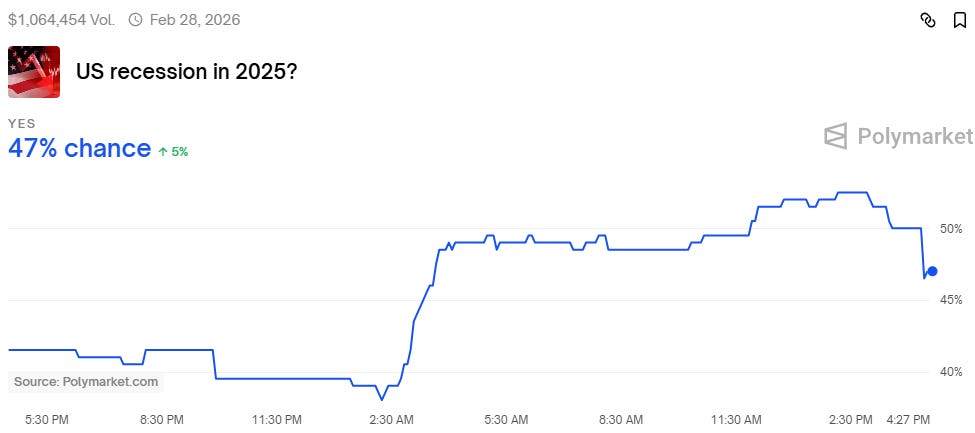Hello Dispatchers. It’s “Liberation Day” for those in the US - maybe not so much of a liberation for the crypto folks though. We hear you, hang in tight.
"Foreign nations will finally be asked to pay for the privilege of access to our market - the biggest market in the world," US President Donald Trump declared on Tuesday evening.
Trump stood before cameras in the White House Rose Garden holding oversized boards displaying tariff rates for dozens of countries. The visual theatre of America's 45th president reading off reciprocal tariffs nation by nation left markets struggling to process the implications of what one X post described as "truly insane to watch."
Supporters hailed the decision, while others scoffed. Some commentators on X were quick to point out a fault in the tariff calculation. What followed was drama — on and off the bourses.
As the dust settles on one of the most consequential economic announcements of Trump's second term, we process in today’s dispatch:
How a sweeping 10% baseline tariff on nearly all imports triggered a market wipeout
Why Bitcoin plunged, yet again, in the aftermath
Which crypto assets were hit hardest (including the President's own memecoin)
How have recession fears shaped up after the announcement
What crypto stakeholders should expect in the coming weeks
Special Deal for Traders: Big Funds, Bigger Profits!
Tired of trading small? What if you could trade with serious capital — without risking your own? That’s where Propexito comes in.
Here’s the deal
Pass the challenge & prove you’ve got the skills
Get funded and trade with Propexito’s capital
Keep up to 90% of your profits—because you earned it
TTD exclusive: 20% off your challenge with code TTD20
No more excuses. No more small trades. Just pure profit potential.
Grab your 20% discount & start trading with Propexito!
Slapping Tariffs, Nation by Nation
The scope of Trump's tariff plan exceeded even the most pessimistic analyst expectations. Rather than targeting specific countries or sectors, the administration announced a three-part approach:
A baseline 10% tariff on imports from all countries effective April 5, with exceptions only for goods compliant with the USMCA (US-Mexico-Canada Agreement)
"Reciprocal tariffs" set at roughly half the rate Trump claims other countries impose on American goods, with China facing 34%, the European Union 20%, Vietnam 46%, Taiwan 32%, and Japan 24%
A separate 25% tariff on all foreign-made automobiles, effective at midnight
The president justified the approach by claiming the US was returning to its historical roots, stating: "From 1789 to 1913, we were a tariff-backed nation."
Get 17% discount on our annual plans and access our weekly premium features (HashedIn, Wormhole, Rabbit hole and Mempool) and subscribers only posts. Also, show us some love on Twitter and Telegram.
The Immediate Fallout
The market response was swift and brutal.
Within 15 minutes of Trump's announcement, the S&P 500 lost more than $2 trillion in market capitalisation — roughly $125 billion evaporating per minute, The Kobeissi Letter said in a post on X.
All three major US index futures plunged into the red, with the Dow down 1.26%, S&P 500 falling 1.16%, and Nasdaq dropping 1.20% in after-hours trading. These sharp declines signal what could be a challenging opening for Thursday's trading session.
Cryptocurrency markets weren’t spared from the battering. Bitcoin initially surged to $88,500 during the early moments of Trump's speech but quickly reversed course as the full scope of the tariffs became clear. By late evening, Bitcoin had fallen 2.3% to $83,293, erasing nearly all of its gains from the previous week.
Bitcoin then recovered marginally to trade around $83,500.
Altcoins fared significantly worse, with Ethereum breaking below the psychologically important $1,900 level. Solana, Dogecoin, XRP, and Cardano all posted losses between 5-6%.
Crypto market continues to look like a pool of blood.
President’s Official $TRUMP memecoin too plummeted more than 10%, falling below $10 despite its namesake's moment in the spotlight. This decline underscores how thoroughly risk-off sentiment has gripped markets following the announcement.
The Fear & Greed Index, which measures market sentiment for Bitcoin and other cryptocurrencies, slipped further to a score of 24 — classified as "extreme fear" — from 29, in its April 2 update, reflecting the sudden shift in investor psychology.
The Good, Bad and Ugly of Tariffs
The severity of Wednesday's market reaction was also about how they exceeded already pessimistic expectations. Most analysts had priced in reciprocal tariffs between 15% and 20%, Sevens Report Research founder Tom Essaye told Blockworks.
Instead, the 10% baseline on virtually all imports, combined with country-specific rates reaching as high as 46% for Vietnam, created a shock that markets struggled to absorb.
Adding to the uncertainty, observers quickly noted discrepancies in how the tariffs were calculated.
James Surowiecki, a contributing writer at The Atlantic, posted a detailed analysis on X revealing that the administration did not actually calculate tariff rates and non-tariff barriers as claimed.
"Instead, for every country, they just took our trade deficit with that country and divided it by the country's exports to us," he wrote, providing the case of Indonesia as an example.
The analysis revealed additional inconsistencies, including the administration's decision to ignore services entirely when calculating tariff rates, focusing only on goods. This approach artificially inflated many of the claimed foreign tariff rates, as the US runs a trade surplus in services with many countries.
These irregularities have only heightened market anxiety, with Polymarket — the prediction platform that accurately forecast Trump's election win — showing odds of a US recession this year touching 50% from 39% before Trump’s “Liberation Day” speech.
Crypto-Specific Impact
While all risk assets felt the sting of Trump's tariff announcement, the crypto industry faces unique challenges that could shape its trajectory in the coming months.
Bitcoin mining companies, already operating in a highly competitive global market with thin margins, may be particularly vulnerable.
Read: Bitcoin Miners Books Bleed Red
"The bitcoin mining industry depends exclusively on ASIC computer chips that come from China. Hikes on tariffs for these products will make production costs for miners higher and their businesses less profitable,” Alexander Blume, CEO of Two Prime Digital Assets, told The Block.
The 34% tariff on Chinese imports could significantly increase the cost of mining equipment, potentially forcing smaller, less efficient US mining operations out of business. Mining stocks reflected this concern, with Core Scientific down 8.5%, Marathon Digital dropping 7%, and Riot Platforms falling 5.6% in after-hours trading.
Another Bitcoin miner Hive Digital‘s CFO Darcy Daubaras offered a different perspective.
He pointed out that many US-based mining companies now purchase equipment from manufacturing facilities outside China. “Higher hardware prices in the US will likely push out less efficient miners, potentially leading to lower network difficulty and improved profitability for those with lower operational costs," he told The Block.
The Response and Long-Term Outlook
International reaction to Trump's tariff bombshell has been swift, with early signs pointing to coordinated pushback from America's largest trading partners.
Longstanding rivals China, Japan, and South Korea have reportedly agreed to form a joint response to the US tariffs.
For crypto and traditional markets alike, the most significant longer-term concern centres on inflation expectations.
McCann of Asymmetric told Decrypt that one-year inflation swaps have already climbed above 3.3%, potentially forcing the Federal Reserve to maintain higher interest rates for longer than previously anticipated.
"Crypto is at the behest of macro and traditional markets at this point. Without a clear and distinct catalyst, crypto is simply going to trade like any other risk asset,” McCann said.
Token Dispatch View 🔍
Trump's "Liberation Day" tariffs have exposed a painful reality for crypto: the digital asset revolution remains deeply vulnerable to traditional economic policy.
As Bitcoin fell in lockstep with equities following the announcement, the dream of cryptocurrency as an independent asset class took another hit.
For an industry that has long positioned Bitcoin as "digital gold" that thrives during economic uncertainty, the synchronised decline with traditional markets creates an identity crisis. The correlation between crypto and equities during macro shocks has strengthened rather than weakened over time — suggesting that in times of genuine economic stress, investors still view digital assets through the lens of risk rather than refuge.
The crypto mining sector faces a particularly ironic dilemma. An industry built on decentralisation and independence from government control now finds its profitability directly impacted by governmental trade policy. The 34% tariff on Chinese imports could reshape the competitive landscape, accelerating industry consolidation while potentially benefiting miners operating outside US borders.
As recession probabilities jump to nearly 50% on prediction markets, crypto investors must ponder if the sector has truly built anything that can withstand broad economic headwinds.
Or will cryptocurrencies continue to function primarily as amplified barometers of market sentiment - rising higher in good times but falling harder when uncertainty strikes?
For now, it seems the answer leans toward the latter, with even the president's own memecoin proving no exception to market gravity.
Token Dispatch is a daily crypto newsletter handpicked and crafted with love by human bots. You can find all about us here 🙌
If you want to reach out to 200,000+ subscriber community of the Token Dispatch, you can explore the partnership opportunities with us.
Fill out this form to submit your details and book a meeting with us directly.
Disclaimer: This newsletter contains sponsored content and affiliate links. All sponsored content is clearly marked. Opinions expressed by sponsors or in sponsored content are their own and do not necessarily reflect the views of this newsletter or its authors. We may receive compensation from featured products/services. Content is for informational purposes only, not financial advice. Trading crypto involves substantial risk - your capital is at risk. Do your own research.















